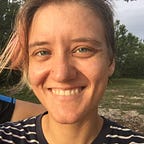From Wild Poet to MFA Applicant: A Lyric List of What I Wish I’d Known
1. I wish I’d tossed away other people’s advice and suggestions unless they were actually useful.
2. Applying to a total of twelve MFA programs during two application cycles, I learned that if it feels like a program is the right choice on a gut level, do it. But if a particular MFA program is going to put you into tens of thousands of dollars in debt, don’t.
3. I am grateful for advice I received about how student debt follows you like a creepy zombie. I’m glad I found a program that paid me to go there. Though somehow, at first, I didn’t quite realize that this agreement entailed teaching classes in composition and rhetoric.
4. I didn’t like teaching for the first year. It’s not that I disliked working with students or the chance to spend time discussing ideas. I didn’t like the depth of responsibility, the pressure of grading one assignment just to plan the next, and the way that teaching forced me to address perfectionism head-on. But I’m glad I stuck with it.
5. My second year of teaching, I felt a great shift involving some profound connections between teaching and writing. (If you believe in the Saturn Return, well, that’s what happened: I went through a professional identity crisis to become a writer-who-teaches.)
6. Find a program that will teach you how to teach. Do they just throw you into the classroom to fend for yourself, or do they combine teaching experience with pedagogical training? The pedagogy classes I took became inextricable from my creative work. Pedagogical training made me a better teacher, but also a better writer. Taking pedagogy classes made me a better communicator.
7. A few shreds of advice about the MFA application process, organized at random: a) Don’t judge an MFA program by its complicated digital application interface, b) I never even received a proper yes or no from one of the schools. The order of the universe is chaos, c) Assess cross-genre offerings…or whether genre-bending is forbidden, d) When you’re applying, don’t sweat too much about the GRE. (Some may disagree, but this is just my two cents.) I’ve heard that a lot of MFAs don’t even look at the math sections. I’ve heard some MFAs don’t look at the verbals, either; it’s just that the institution requires them to collect scores from applicants.
8. I’ve come to think of MFA admissions as a matchmaking endeavor, not a competition for whose writing is “better.” I’ve heard that admissions committees accept students they could see themselves working with, students who are “teachable,” interested in the give and take of learning and teaching simultaneously. Also, if you don’t get accepted or receive funding, these things may be beyond any particular professor’s control.
9. I wish I’d bought the student dental plan right away when I arrived at grad school.
10. I learned in the five years I was out of school — the “free” years between my two rounds of MFA applications — that you don’t need an MFA to write or publish. Many of my friends and I have tended to publish at about the same rate regardless of if/when we started MFA or PhD programs.
11. I learned by observation that going to a prestigious program doesn’t guarantee you’ll publish or even write. (I love Marge Piercy’s poem “For the young who want to” for more and better advice on this.)
12. I learned that when a significant other didn’t care to read my work or attend literary events with me (even if they, themselves, weren’t a writer), they weren’t right for me! I learned that I shouldn’t waste time with anyone who doesn’t respect an essential part of my spirit or partner with a person who’s jealous of my success.
13. I learned to value open mics, writing groups, conferences, online communities, bookstores, galleries, artist collectives, etc. just as much (or more) as any university’s offerings.
14. I learned that anybody who says there isn’t any money in writing is uninformed or lying. I’ve worked as a content writer (writing “advertorials” for exterminators and personal injury attorneys, but hey, I was writing!), copy editor, grant writer, typewriter poet for-hire, writing tutor and instructor, writing coach, teaching artist, workshop facilitator, etc. I learned to put myself out there, to tell people that A) I’m a writer, and B) I’m for hire.
15. I learned to say yes to every opportunity I could, even if I felt unqualified. Some of my paying work came through connections from volunteering at a festival, hosting a reading, writing reviews, etc.
16. I learned to value rejections. It meant I was participating.
17. I learned even more about classism in literary establishments. So many opportunities have a monetary price-of-entry. Classism goes deeper than I have room to write about here. (Check out Jaswinder Bolina’s essay “The Writing Class” on the Poetry Foundation’s website.) I learned that it’s up to each of us to address classism, literary or otherwise, anytime we have access or power to do so.
18. I learned the importance of setting non-academic deadlines, especially over school breaks. A recent interview with Garth Greenwell discussed how school puts artificial deadlines in place, but the real challenge is meeting your own deadlines after you graduate. I’d add that having another discipline (meditating, walking daily, etc.) or ritual can help with practicing routine.
19. I learned that going outside, drawing, pondering (AKA staring into space without feeling guilty or weird), yoga and other forms of stretching, dancing, making friends who are older or younger, running, talking to people on the bus, etc. may all be part of one’s writing practice.
20. But, in terms of “becoming a writer,” reading, writing, and trying to get the work out there is kind of all that really matters.
